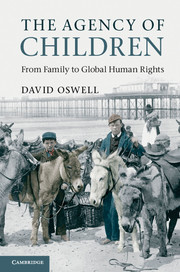Book contents
- Frontmatter
- Contents
- Figures
- Acknowledgements
- Part I Introduction
- Part II Social theories of children and childhood
- Part III
- 6 Family and household
- 7 School and education
- 8 Crime and criminality
- 9 Health and medicine
- 10 Play and consumer culture
- 11 Political economies of labour
- 12 Rights and political participation
- Part IV Conclusions
- Bibliography
- Index
9 - Health and medicine
Published online by Cambridge University Press: 05 April 2013
- Frontmatter
- Contents
- Figures
- Acknowledgements
- Part I Introduction
- Part II Social theories of children and childhood
- Part III
- 6 Family and household
- 7 School and education
- 8 Crime and criminality
- 9 Health and medicine
- 10 Play and consumer culture
- 11 Political economies of labour
- 12 Rights and political participation
- Part IV Conclusions
- Bibliography
- Index
Summary
Much of the sociology of childhood, as I have already indicated, has sought to offer an account which, although it acknowledges the biological immaturity of the child, considers the child as a social being. Much of the criticism has been directed to biological accounts of the child’s body (in terms of growth and maturation) and to psychological accounts of the child’s mind (in terms, primarily, of cognitive development). But in children’s everyday lives there is no single bifurcation of the social and the natural. When children brush their teeth in the morning or forget to do so, when they go to the dentist every six months or fail to do so, and when their teeth fall out and they are given silver coins from the tooth fairies, there is not a keen division between social conduct, habits and regularised routines, on the one hand, and the work of the human body, either passive to the social or steadfastly determining, on the other. Over the course of a young lifetime, a child with a chronic illness, whose regimen of care dictates the taking of different pills over the course of the day and visits to the paediatrician for examinations regularly over the course of the year, does not disclose the natural or the biological more than any other child. Nevertheless, what is clear is that a sociologist, a psychologist, a psychiatrist or a paediatrician is often interested in different bits of the child’s body, different forms of movement, different relations of bodies and different relations of scale. They all certainly understand these through different rationalities, methods and methodologies. But sociologists over recent years have become more interested in the movement of a disease or the habits of a medication in the context of different scales of materiality and association (Fraser, 2001; Mol, 2002; Rosengarten, 2009). In this chapter, then, we explore how children’s bodies and movement become disclosed as an object of medical science and as an object of concern regarding health. And in particular we inquire as to how our understanding of this disclosure might lead us to reassess our understanding of agency with respect to children.
- Type
- Chapter
- Information
- The Agency of ChildrenFrom Family to Global Human Rights, pp. 162 - 192Publisher: Cambridge University PressPrint publication year: 2012



